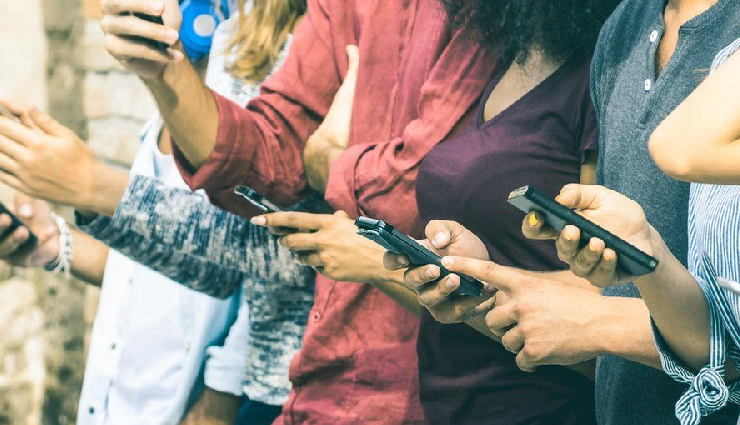- Home›
- Mates & Me›
- 9 Dangers Of Social Media And Your Self-Esteem
9 Dangers Of Social Media And Your Self-Esteem
By: Priyanka Maheshwari Mon, 11 Mar 2024 12:40:12

You may dismiss the notion of social media posing any real dangers. After all, it's just an online profile, right? However, there are numerous reasons to approach social media with caution, and surprisingly, most of these concerns extend beyond just privacy.
While much emphasis is placed on safeguarding privacy online, little attention is paid to protecting one's self-esteem. It's likely that you haven't been warned about the detrimental effects social media addiction can have on your self-esteem. Unbeknownst to many, every minute spent on social media chips away at our confidence.
It's ironic that a platform designed for sharing achievements and highlights can also serve as a catalyst for undermining our self-confidence. In this feature, we'll delve into the lesser-known dangers of social media and how they can impact us.
The advent of the internet has revolutionized our lives, enabling us to communicate effortlessly with individuals on the opposite side of the globe with a mere click. Similarly, purchasing goods from distant locations and receiving them promptly at our doorstep has become seamlessly convenient.
Initially conceived to foster connections across vast distances, social media platforms have evolved to become instrumental in keeping us interconnected, regardless of geographical barriers. Remarkably, researchers have discovered that every individual with a social media presence worldwide can be linked to one another through mutual "friends" or "followers."
Amidst continuous technological advancements, social media stands as a testament to our transition into a digital age. Today, even strangers can gain insight into our daily activities and whereabouts with unprecedented ease.

# What you witness online is typically the highlight reel of everyone else's lives. People tend to showcase only the best aspects, omitting the challenges and imperfections. So, when we scroll through our social media feeds, all we encounter are seemingly flawless and successful portrayals.
The prevalent peril of social media lies in the fact that individuals rarely share their struggles or mundane moments, opting instead for curated perfection. It's easy to feel inadequate when confronted with someone's idealized photo, oblivious to the numerous attempts it took to capture it. Social media often presents a facade, and it's crucial to bear this in mind before succumbing to comparison.
# Comparing our lives to others' is a common pitfall of social media usage. Consuming the seemingly perfect lives displayed online can lead to feelings of inadequacy and self-doubt. However, this comparison is inherently flawed.
This tendency to compare extends beyond polished photos to include posts about engagements, promotions, or family life. Yet, relying on such online portrayals for self-assessment is unreliable. Behind closed doors, individuals grapple with challenges unseen on their feeds. It's effortless to fabricate a flawless existence on platforms like Instagram, contributing to the false narrative of perfection.
-1710139569-lb.jpg)
# Authentic self-expression often takes a backseat in the realm of social media. Many individuals find themselves suppressing their true identities in an effort to conform to trends and garner approval. Consequently, they may feel a sense of detachment from their genuine selves.
The allure of conforming to popular trends in exchange for validation and likes can diminish one's individuality. This loss of authenticity is a significant hazard of social media, perpetuating a facade that obscures genuine character and personality.
# Social media fosters a culture of concealing personal struggles and vulnerabilities. Individuals feel compelled to maintain a facade of happiness and success, despite facing challenges in their lives. This pressure to present an idealized version of oneself exacerbates feelings of inadequacy.
The disparity between one's own struggles and the seemingly perfect lives depicted online can severely impact self-confidence. Constantly comparing one's darkest moments to others' highlight reels undermines self-esteem and perpetuates an unrealistic standard of happiness.

# Advertising on social media platforms can also negatively impact self-esteem. Ads featuring flawless models and idealized lifestyles often trigger feelings of inadequacy and comparison.
The abundance of advertisements on social media, combined with their targeted approach, heightens the risk of individuals comparing themselves unfavorably to unrealistic standards. Despite knowing the manipulative nature of ads, individuals may still find themselves succumbing to feelings of inadequacy and self-doubt.
# Social media can foster superficial connections rather than genuine friendships. Many interactions on platforms like Facebook or Instagram remain confined to the digital realm, lacking the depth and authenticity of real-life relationships.
This superficiality can breed feelings of insecurity and loneliness. Despite the ease of forming online connections, sustaining genuine friendships requires more than mere likes and comments. Distinguishing between true friendships and superficial online interactions becomes increasingly challenging in the digital age.
# Social media platforms thrive on attention-seeking behavior. Individuals seek validation through likes, shares, and comments, equating social approval with self-worth. However, the absence of validation can significantly impact self-esteem.
The relentless pursuit of attention on social media can lead to feelings of inadequacy and self-doubt when expectations aren't met. Deleting posts that fail to garner sufficient reactions exemplifies the detrimental effect of equating social validation with personal value.
-1710139798-lb.jpg)
# Excessive use of social media can detract from real-life social interactions, hindering meaningful connections and exacerbating feelings of isolation. Despite its intended purpose of connecting individuals, excessive reliance on social media can undermine genuine relationships.
Ironically, the very tool designed to foster connections may inadvertently isolate individuals from meaningful social interactions. Without careful moderation, social media can erect barriers within existing relationships, hindering genuine human connection.
# Seeking validation through social media interactions can lead to fluctuations in self-esteem. While receiving likes and comments may initially boost self-confidence, reliance on external validation can erode intrinsic self-worth over time.
The pursuit of social validation can distort perceptions of self-worth, placing undue importance on external affirmation. Consequently, individuals may prioritize others' opinions over their own, compromising their sense of self-esteem and authenticity.





